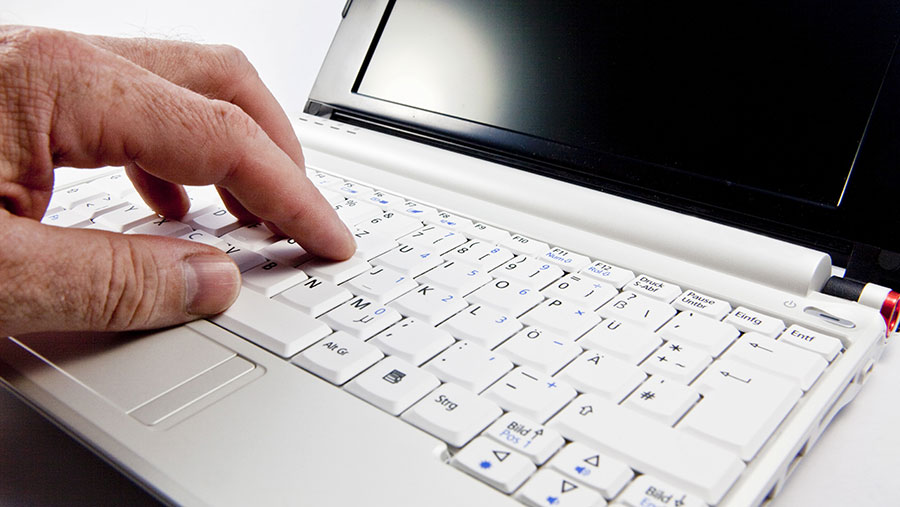When is it time to upgrade your farm computer?
 © Martin Moxter/imageBROKER/Shutterstock
© Martin Moxter/imageBROKER/Shutterstock Many farmers would benefit from upgrading or replacing their computer sooner than they might think necessary, according to the Farm Advisory Service (FAS) in Scotland.
The farm computer has become one of the most essential bits of kit on the farm – whether it’s for research, sending emails, reporting cattle movements, updating spray records or submitting online VAT returns.
There are times when it will be obvious that a new computer is overdue, not least when using it becomes tediously slow, the blue screen of death becomes a familiar sight and the often-heard advice to turn it off and on again produces little in the way of results.
However, the FAS points out that if the operating system used on the computer is no longer supported, the computer may not be fit for purpose and PCs could become vulnerable to viruses or malicious software.
See also: How to get your bid in for £35m diversification grant scheme
Chloe McCulloch from SAC Consulting, a part of Scotland’s Rural College that delivers the FAS programme, says: “While it might be obvious that a new computer is overdue, some farmers would benefit from upgrading or replacing their computer, even if it still works, because their operating system is no longer supported which is a security risk.
“Farmers use many specialist software products, but relatively few of these will require more than a fairly basic modern computer.
“A few hundred pounds is a relatively small investment in farming terms for something that is vitally important for farm security.”
However, those who want to employ the computer for personal uses such as watching movies, editing photographs or gaming are more likely to need to exceed a basic spec, she says.
Windows 7
The most common operating system for desktop and laptop machines is Microsoft Windows, but Microsoft only produces security updates and offers technical support for versions that it still supports.
For example, Windows 7 support will end after 14 January 2020, and all users are being advised to switch to a more modern operating system, such as Windows 10, ahead of that date.
Depending on the age of your computer, it may be possible to upgrade to a new operating system without replacing the machine.
A suitably qualified computer engineer should be able to advise you on the best course of action.
The FAS offers the following top tips on buying a new farm computer:
1. Budget
While farms may be using specialist software products, relatively few of these require more than a basic modern computer.
Expect to pay about £300-£500 plus VAT for a basic laptop capable of most farm business functions.
The FAS also suggests budgeting an additional £150 plus VAT for a large widescreen monitor, keyboard and mouse.
2. Technical specification
Computer specs can baffling, but it basically boils down to the speed of the computer and how much memory it has.
The speed of the central processing unit (CPU) is measured in gigahertz (GHz) and the higher this number, the faster the computer.
The number of cores the machine has (for example, dual-core, quad-core) is also relevant, as the more cores a computer has, the more it can do without slowing down.
There are two types of memory to consider – random access memory (RAM), which is needed by the computer to function as you flick between programmes, and the hard drive, which is where information and photos are stored – unless you choose to store them in a “cloud-based” storage system.
Most laptops in the £300-£500 price bracket will come with a dual-core processor, 4GB of RAM, and a hard drive of at least 256GB. This should be adequate for routine use by small to medium-sized farming businesses.
A machine of this spec should allow the user to operate cloud-based accounting programmes, livestock recording programmes (although it is always worth checking with your software provider), store some files and photographs, and do the online shop.
About £500-£600 should secure a laptop with a quad-core processor and 8GB RAM, both of which will be worthwhile upgrades for regular users and those planning on using more sophisticated cloud-based software – for instance, crop management programmes.
It is also worth considering who will operate the machine – if you have a skilled operator entering data into an accounting programme, the benefits of a faster machine are likely to be appreciated.
3. Laptop v desktop?
There isn’t a huge difference in price between laptops and desktop machines.
Laptops have the same advantages as a desktop machine, in that you can attach it to a monitor, keyboard and mouse, but with the added flexibility that you can take it with you when you are on the go.
4. Monitor and keyboard
It’s worth using a monitor, keyboard and mouse, even with a laptop.
They can make navigating around programmes easier and quicker and allow for an improved seating position, which is better for your back.
Entering data is also much quicker if using a keyboard with a numerical keypad.
5. Where to buy?
It is broadly a choice between buying online, from a national chain of stores or from a local independent computer shop.
Buying online or from a national chain can be cost-effective, but there can be significant advantages to buying a machine locally for anyone who knows they are likely to need extra support.
A local supplier may be able to help set it up and provide ongoing technical support without needing to send the machine away.
